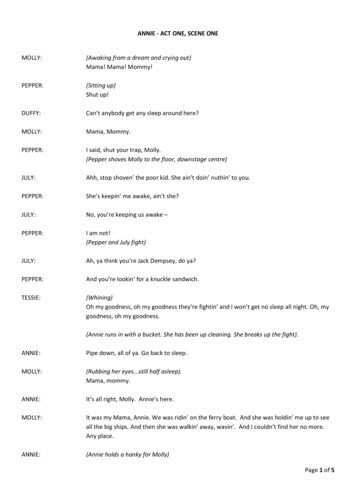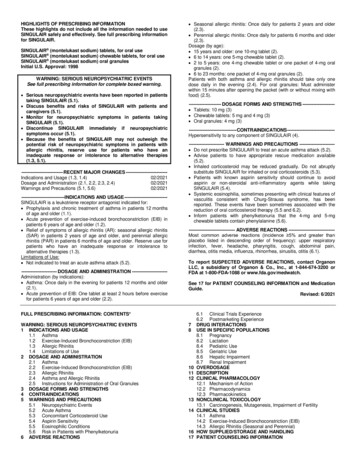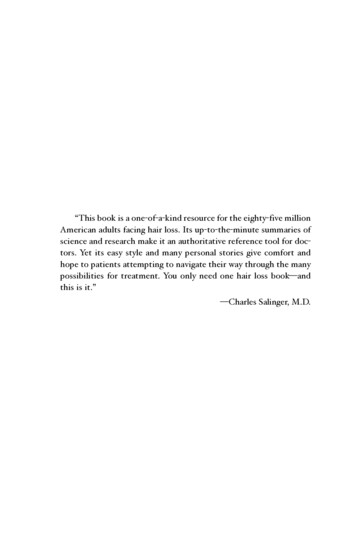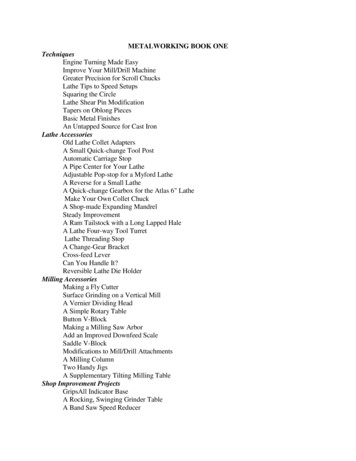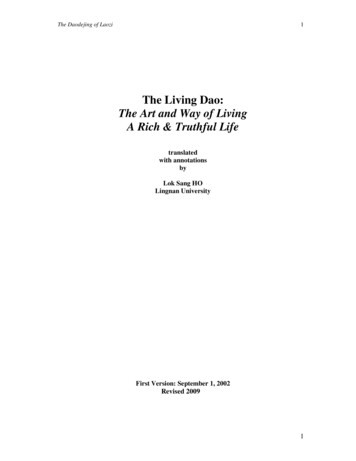
Transcription
The Daodejing of Laozi1The Living Dao:The Art and Way of LivingA Rich & Truthful Lifetranslatedwith annotationsbyLok Sang HOLingnan UniversityFirst Version: September 1, 2002Revised 20091
The Daodejing of Laozi2AcknowledgementsI am indebted to all the earlier translators of Laozi, many of whom had translated in abeautiful language and had succeeded in conveying much of the essence of Laozi’steachings. I am particularly indebted to Prof. James Hsiung of New York University,Prof. Yew-kwang Ng of Monash University, and Prof. Laurence Wong of LingnanUniversity for reading through my manuscript and offering very useful suggestions andadvice.Naturally, different translators had interpreted Laozi differently in places. I am lucky inthat I have the benefit of referring to all these different interpretations, dwelling onthem, and in the end unlocking many puzzles that had remained in many of the existingtranslations.My task is simple: to preserve the meaning of Laozi, to write in plain language, and tolet the world know that Daodejing is a practical, down-to-earth guide for any one whoaspires to live a rich, peaceful life in harmony with nature.Lok Sang HoHong KongSeptember 1, 20022
The Daodejing of Laozi3The Living Dao is LivingBecauseIt is not bound by the text of this or thatversion of Laozi.Names are but names.Languages are only languages.The translator seeks the truth,the way of living,that will bring peace to the mind and the world.In this he is confidenthe is one with Laozi.3
The Daodejing of Laozi4PrefaceJoseph Conrad, in his famous Preface to The Nigger of the Narcissus, wrote that therole of the artist is no different from that of the thinker or that of the scientist. Like thelatter, he is after the Truth, but whereas the scientist seeks the truth about the physicalworld, the artist seeks the Truth about the human mind. “The artist appeals to that part ofour being which is not dependent on wisdom: to that in us which is a gift and not anacquisition ” Conrad believes this Truth is universal, and that it lies within each of us. Hespoke of “the subtle but invincible conviction of solidarity that knits together the lonelinessof innumerable hearts, to the solidarity in dreams, in joy, in sorrow, in aspirations, inillusions, in hope, in fear, which binds men to each other, which binds together allhumanity—the dead to the living and the living to the unborn.” By this he testifies to theuniversality of human nature. Interestingly, Laozi shares with Conrad the distrust foracquired knowledge or human intelligence—what Conrad referred to as wisdom. Certainlythere is more to logic and reason in human nature than the hopes and fears and the joys andsorrows that he talked about. Thus the aim of art lies “not in the clear logic of a triumphantconclusion; it is not in the unveiling of one of those heartless secrets which are called theLaws of Nature. It is not less great, but only more difficult.” 1In the same way, Laozi (often spelled as Lao-Tzu), who wrote the Daodejing, tried todescribe the indescribable. The truth about the human mind, and about the universal mind,cannot be sought from without. It must be sought from within us. This understanding is agift, and is not acquired. Indeed, those who try to seek that truth from without are bound tofail. Indeed, we need to unlearn to rediscover the gift. From this perspective it is amazinghow much in common there is in Laozi and in Conrad. And it is just as amazing how muchcommon ground there is in the teaching of the Buddha and in that of Laozi.Laozi used words sparingly, truthful to his belief that words easily becomesuperfluous. People may be misled by words to think in crooked ways. This is also exactlythe message of Zen(or “Chan”) Buddhism 2. He would rather use words that trigger thereflective mind. As his subject is really indescribable, he would use symbols. Theproliferation of symbolism in the Daodejing is remarkable. “The Valley Spirit”(谷神) is acase in point. In Chinese, the valley provides the image of having a capacity to acceptcriticisms and alien views. There is the expression “xuhai ruo gu”(虛懷若谷), which meansliterally “humble and receptive like the valley.” The mystical female is another example ofsymbolism. The door of the mystical female, which chapter 6 called the “root of heavenand earth,” stands for the source of abundance. Laozi tells us that humility is the origin ofcreative ideas and a rich life.The images in Laozi are very effective, but they require imagination. Unfortunately,imagination can go wild, and often times, translators and readers are bewildered by themystical use of language.1Laozi apparently respects the Laws of Nature much more than Conrad. Actually, however, Laozi thinksof Nature not as something external to the individual to be studied scientifically, which is the sense usedby Conrad in this context. Laozi sees Nature as a way of life, and being one with Nature a goal.2Zen is the Japanese pronunciation of the Chinese word “chan,”(禪) which is itself the transliteration ofthe Sanskrit term dhyana.4
The Daodejing of Laozi5To understand Laozi, we have to understand that he offers a practical way of life, not amystical recipe to immortality. Paradoxically, however, this practical way of life offers aglimpse to the eternal world. Watch Conrad’s closing remarks in the Preface to The Niggerof the Narcissus: “behold—all the truth of life is there: a moment of vision, a sigh, asmile—and the return to an eternal rest.” Compare this language “a sigh, a smile” with thefamous episode when the Buddha communicated with one of his disciples. He took up aflower, smiled, and the understanding about life was instantaneously and spontaneouslycommunicated to and realized by that disciple. Then of course there is that famous versefrom William Blake: “To see a world in a grain of sand and a heaven in a wild flower, holdinfinity in the palm of your hand, and eternity in an hour.” Truthfulness is eternality.Consider Laozi’s Chapter 70, in which he says “What I say is easy to understand andeasy to practice yet few people under heaven understand and practice it.” Compare thiswith the opening sentence in Chinese Zen (Third Patriarch)Master Sengcan’s(僧燦) Song ofthe Truthful Mind(信心銘) which reads “The supreme way is not difficult, so long aspeople refrain from preferences.” ( 至 道 無 難 , 唯 嫌 揀 擇 ) The importance of theundiscriminating mind is clear in Chapter 49: “If people are good, I shall be good to them.If people are not good, I shall also be good to them. This way I am really good. If peopleare truthful, I shall be truthful to them. If people are not truthful, I shall also be truthful tothem. This way I am really truthful.” The Sage’s mind is uncalculating and free from allpretences like an infant’s. Again quoting from Sengcan “All tendencies to go to oneextreme or to the other arise from the calculating mind.”(一切二邊,良由斟酌。)What is, then, this practical way of life that Laozi recommends? It is a life in unisonwith nature. To be with nature is to forget about the narrow self that limits our potential fordevelopment. If something is done, one who follows the Dao would not say: “It is me whoachieved it.” One would not take any credit because, in the first place, there is no conceptof me or I as a separate, independent existence. Moreover, one would only be doing thingsthat one’s inner nature calls upon and enables one to do.To be with nature one will realize a subtle joy, and this joy is not something to bereaped in the next world. Some people think that Daoist philosophy is “out of theworld” but it is really very much “of the world.” In Chapter 80, Laozi saw a world inwhich people enjoy their foods and beautiful dresses, live happily in peace, and takedelight in their traditions. Consider Chapter 59, in which Laozi says, “To rule overmen or to serve heaven nothing works as well as following the farmer’s example. Thefarmer does his preparatory work early. To be like him, one must pay attention to theaccumulation of virtue. That way one can overcome all difficulties. That way one’sability knows no limit. That way one can sustain a nation.” Chapter 64 advises: “Peopleoften fail in their tasks when they are about to accomplish them. If only they take thesame care in the end as they do in the beginning, they will avoid many failures.” Theseare of course very practical, and certainly this-worldly, words of advice.Because Laozi used his words so sparingly, and because the Chinese language issuch that one word can carry multiple meanings, it is easy to be misled. But Laozinever worried about this problem, because after all the insight has to come from within.So he is sure that those who sincerely seek the truth will see the truth(“The door willopen up to whoever knocks,” as Jesus says). Still, we should avoid jumping to5
The Daodejing of Laozi6conclusions. For example, the word 靜is often translated into quietness. But it alsomeans 靜 止 “still,” “undisturbed,” or “rest.” There is reason to believe that Laozireferred to stillness more than to quietness here, since quietness comes from withoutand stillness of the mind comes from within. Keenly aware of the enlightenment thatcomes from within, Conrad also talked about the “eternal rest.” Both Laozi and theBuddha talked about seeing reality as it is when the mind is not disturbed. 3 Anotherconfused and confusing word is 王as used in Chapter 25. 王 is commonly translatedinto king. But in the context Laozi really meant the man who follows the Dao. A kingwho does not follow the Dao cannot be great. This should be very clear from the lastline in Chapter 25, in which he says: “The (great) man emulates the (great) Earth. The(great) earth emulates the (great) Heaven, The (great) heaven emulates the (great) Dao.The (great) Dao emulates the (great) Nature.”The Daodejing is difficult to read because the language sometimes breaksgrammatical rules in order to read smoothly. For example, in Chapter 13, the phrase大患若身should be understood as 身若大患. In Chapter 4, 象帝之先 should be read as 象先之帝.Sometimes, in favor of brevity, Laozi deliberately left out some words. But in the contextwhat he really means should be clear. Disappointingly, some translators took it literally andoften missed the context. This is the case with Chapter 52, in which he advises that as longas we understand that we are the sons and daughters of nature and do our role to respectnature and the good earth as we would respect our mother, we will not run into disaster. Hethen says that blocking the passages and shutting the doors we would be fine while clearingthe passages and opening the doors we would be doomed. What he really means from thecontext is that if we respect nature we will not run into disaster, even if the passages areblocked, but if we forget our role as sons and daughters of nature we would run into trouble.Laozi wants to address the common human weaknesses. He says things that seemextreme, with the attention of shocking readers into self-reflection. Chapter 12 and Chapter65 are cases in point. In Chapter 12, he tells us that “Just as the five colors that we see canblind us, so the five sounds that we hear can deafen us, and the five tastes can dull oursense of taste.” In my translation I added the word “can” to make it sound less extreme. It islikely that the original language sounds extreme because Laozi wanted brevity and/or ashocking effect to make people think.In Chapter 65 Laozi says, “The ruler who rules with his acquired knowledge is likelyto hurt the nation. The ruler who rules not with his acquired knowledge is likely to benefitthe nation.” Certainly we cannot agree that all acquired knowledge is bad for a nation. Butthe fact is that many people are arrogant and think that they are very smart, and that theycan use their knowledge to do just about anything. Laozi warns against that kind ofarrogance. The word “likely” is not in the text of Daodejing. But it is clear that he does notreally condemn education and knowledge acquisition (See Chapter 71, for example). Afterall he wrote using words that he had learnt as a child. So putting in the word “likely” should3There is a famous episode wherein the sixth patriarch of Zen Buddhism, Hui-neng, upon hearingtwo observers debate over whether it was the wind that was moving or the flag flying in the wind thatwas moving, pointed out that the observers were themselves confused, their minds having been moved bywhat was observed.6
The Daodejing of Laozi7preserve his real meaning and help avoid misunderstanding. It is in this spirit that Iconducted my translation. Whenever I added words that are not in the original text,however, I would put in a footnote and explain.For the convenience of the reader I have taken the liberty to add a small title to each ofthe “chapters” to capture the essence of message. It is my fervent hope that Laozi’smessage be put across to as many people as possible. I can say that Laozi did not write theDaodejing as a Chinese, but as a member of the human race. I hope that readers will see theDaodejing not as a sample of Chinese philosophy, but as an exploration to the meaning andvalue of life itself from someone whose inner reflections are unusually sharp and downrighthonest.November13, 2001, Lingnan University, Hong Kong (revised August 4, 2009)7
The Daodejing of Laozi8Book One: The Book of the Way(Daojing) 41.The Nameless Eternal �玄,眾妙之門。Ways that can be spelled out.Cannot be the eternal way. 5Names that can be namedMust change with time and place. 6“Emptiness” is what I call the origin of heaven and earth;“Existence” is what I call the mother of everything that had a birth. 7Appreciate Emptiness, that we may see nature of the Way’s versatility;Appreciate Existence, that we may see the extent of the Way’s possibilities.These two, Emptiness and Existence, came from the same source.Though they bear different names, they serve the same mystical cause.A mystery within a mystery,Such is the gateway to all versatility. 84The version excavated in the Han Tomb Number 3 of Mawangdui, Changsha in 1973 had the De-jingarranged ahead of the Dao-jing, which is contrary to the popular, better-known arrangement. However,Dao(the natural Way) is more basic than De(virtue), as suggested in Chapter 51 道生之,德畜之,物形之,器成之。 Also, the beginning chapter of the Dejing(Chapter 38) clearly says: “The man who haslost the Dao finds refuge in being virtuous,”( 失 道 而 后 德 )furthering underscoring that Dao isfundamental. For this reason, this translation retains the precedence of the Daojing over the Dejing.5The eternal way can be appreciated only by inner reflection and can be lived only by practice.6Laozi warns us against falling into the trap of language. The eternal way does not belong to anyone orany religion. The Christian, the Muslim, the Buddhist, even someone who does not espouse any religioncan practice it and call it the Christian way of life, the Muslim way of life, or the Buddhist way of lifewithout affecting its essence.7These lines may be punctuated differently to produce different meanings. One rather common way is無名,天地之始;有名,萬物之母。 This translates readily into “The Nameless is the beginning ofheaven and earth; the named is the mother of all things.”(cf. Lin Yu Tang) The alternative way ofpunctuating, which some translators(such as Gu Zhengkun(1995)) subscribed to, is: 無,名天地之始;有,名萬物之母。 A direct translation of this would be: “Non-existence is named the beginning ofheaven and earth; Existence is named the mother of all things.” My translation is a variant of this version.8In this chapter Laozi warns against the pitfalls of using names and labels. Names and labels are theproduct of human intelligence which has limits. People inevitably associate all kinds of unintendedmeanings to names and labels. Soon language becomes a barrier to communication rather than an aid tocommunication. The name of God, for example, has divided mankind and has produced horrendoussuffering. Actually all names are the product of men’s creation and need not have any intrinsic meaning.The Buddha warned against the use of labels when he says “The Buddha’s teachings so known are thesame as non-Buddhist teachings. They are called the Buddha’s 8
The Daodejing of Laozi2.9Relativity and the Meaning of 不居,是以不去。People under heavensee beauty in what they call “beauty.”That way they know of the “ugly.”Similarly people see good in what they call “good,”That way they know of the “bad.”Existence and Emptiness are conceptsthat make sense by comparison.Similarly, long lends meaning to short, and high to low.Harmony is produced when sounds combine in unison.Because the fore goes, so the back follows.Thus the Sage would not act as if he could act on his will.He teaches the unspoken teaching.No word is ever spoken, yet living things thrive.No ownership is claimed, though Nature begets all creation.Humility is maintained even as achievement is made 9.No credit is claimed even as work is done.Because no credit is claimed, so no credit is ever lost. 10佛法).Many translators take the implicit punctuation to be: “常無欲,以觀其妙; 常有欲,以觀其徼” In lightof Laozi’s espousal of “scanty desires”(少私寡欲, Chapter 19) and his belief that not being content withwhat one has and craving to possess are the source of many ills(禍莫大於不知足, 咎莫大於欲得Chapter 46), I adopted Gu(1995)’s interpretation, resulting in “常無,欲以觀其妙; 常有,欲以觀其徼.” 妙 is very difficult to translate. It is rich in meanings, encompassing the meanings of versatile,exquisite, subtle, and mystical. The word is used both in Buddhist and Daoist scriptures. In Buddhism atypical use of the word is in 真空妙有, which can be directly translated as “real emptiness and mysticalexistence.” Emptiness as used in Buddhism(空)corresponds with nonexistence as used in Daoism(無).9Humility is fundamental to all religions. In Islam, no one should be worshipped as God. God isregarded the source of all creation, but God never dictates anyone’s life and allows all to live a free life.Even its prophets are all believed to have lived a humble life.10The discussion about relativity is also important in Buddhism. The famous Buddhist statement, 諸法因緣生,諸法因緣滅--just as all phenomena arise from main and subsidiary causes, so they also vanishfrom main and subsidiary causes-- is in the same spirit. The Buddhist concept of emptiness 空 refers tothe fact that none of the things and concepts that we know have an independent existence. Everything inthe phenomenal world is transient and depends on the working of the main and the subsidiary factors(因and 緣)in order to come about or to survive. The wise man, fully understanding this, simply does hiswork and claims no credit and possesses nothing, for there is nothing to possess.9
The Daodejing of Laozi3.10The Art of 治。The wise ruler treats able menthe same as he would treat others.In so doing he avoids strife.He plays down precious goods.In so doing he discourages theemergence of thieves.He makes an effort to stem theemergence of objects of desire.In so doing he ensures that his citizens’ mindsWill not be thrown into disarray.Thus the Sage’s governanceSatisfies the real needs of people,While emptying their minds of desires;Builds up the inner strengths (bones) of peopleWhile weakening their vain ambitions. 11He would preserve the natural simplicityof his citizens’minds and reduce their desires.In so doing the clever people will learnthat their contrivance will not work.Because the Sage does nothing but followingthe law of natureNothing will deviate from their natural and orderly places.11What are real needs and what are vain desires is a controversial subject. But it should not be. Ourinner voice should be able to tell what we really need. Will we listen? All the sages through the ageshave been telling the same story. The biblical story about Adam and Eve conveys exactly the samemessage. The Bible says that God had provided Adam and Eve with everything they needed. They couldlive happily forever. However, they were not satisfied, and were “tempted” to eat the “forbidden fruit.”According to the Bible, man has inherited the original sin committed by Adam and Eve. In point of fact,we do not realize that we ARE LIVING in Paradise. The earth is so abundantly supplied with everythingwe need that we could have no wars, no famines, and no shortages. Yet we fight among ourselves andare not satisfied with what we have. Our suffering is our own making because we all want to eat theforbidden fruit—a figure of speech for our susceptibility to vain desires. Since the ability to withstandtemptation comes from within us—not from without, mind training to restore “stillness of the mind” isextremely important.10
The Daodejing of Laozi4.11The Character and the Benefits of the 帝之先。The Way (Dao) is like water that simmers slowly,Perpetually emitting its energy without boiling over.It is like a deep, deep pool in the mountains,Unfathomable yet could well harbor the origin of all life forms.It can blunt sharp angles,Resolve disputes,Soften light that otherwise dazzles,Re-establish concordance where there is discord.Unfathomable, who would know its existence?Today I know of no child of anyoneWho resembles our ancient forefathers. 12(Who followed the Dao).12Many translations take this passage as saying that the Dao itself is like no child of anyone, and that it islike the ancestor of all of forefathers. There is little point in arguing which translation is correct. Laozicertainly will agree that few of his contemporaries maintain the adherence to the Dao that the ancientmasters are known for. He certainly will also agree that the Dao is like no child of anyone. But the latterseems so obvious that a man of few words as he is probably will not utter such a message.11
The Daodejing of Laozi5.12The Impartial Laws of 窮,不如守中。Heaven and earth are unkind.They treat everything like the straw dogs used in sacrifice.The Sages too are unkind.In their eyes everyone is no different from a straw dog. 13Within the bounds of Heaven and Earth,There is plenty of space,Much like there is space within a bellows.Hollow but unyielding is this space.The more you work on it,The more air comes out.Words are superfluous and soon reach their limits.It is far better to adhere toimpartiality and the middle way.13These passages emphasize equanimity, and bears strong resemblance to the Buddhist teaching ofequanimity. The 金剛經 says “The enlightenment of Buddha is about equanimity. There is no distinctionbetween the high and the low(是法平等, 無有高下).” Buddhist teachings also have it that the mind, theBuddha, and the sentient beings are in essence no different from one another. Only the erring mindmakes distinctions.12
The Daodejing of Laozi136. Humility As the Basis of a Rich ��謂天地根。綿綿若存,用之不勤。The receptive, humble spirit(“the valley spirit”) lives on. 14It is known as the Mystical Female.The doorway of the Mystical Female is known asthe root of heaven and earth 15.From it, imperceptibly yet relentless,Runs the energy.14The original text has two versions. The valley spirit 谷神 is sometimes, indeed in most earlierversions, written as the bath spirit 浴神. The latter does not seem to make much sense. However, sincevalleys are often places where rivers and streams flow, 浴 may still mean valley in ancient China.15As suggested in the Postcript on the Translation of Daodejing, valley is a common Chinese figure ofspeech for a receptive and humble mind. With humility we can learn so much and can realize a rich life.That is why humility is the mother of all beautiful things in life. The opposite of humility is arrogance.Laozi teaches us to be humble and to learn from nature and not to be arrogant and fight against nature.13
The Daodejing of Laozi147. Selflessness as a Way of �邪?故能成其私。Heaven and earth last.It is so because they do not give birth to themselves 16.Similarly the last thing in the Sage’s mindis to propagate his body.Paradoxically, that is why his body advances.The body to the Sage is like any external object.For this very reason his body perpetuates.Is it not true that because he is selfless,That he realizes his true self? 1716生 can mean live and can mean giving birth. In this context giving birth makes better sense.Scientifically, all mortals need reproduction in order to maintain the species. Laozi is saying theconverse, namely, that anything that tries to propagate itself must be a mortal, and that something thatdoes not even attempt to propagate its own life is paradoxically likely to last a long time.17This Chapter is particularly important for our understanding of Laozi’s Dao and historicalDaoist(Taolist) practices. Historical Daoist priests are known to seek a long life through both the use of“waidan”(external elixir) and “neidan”(internal elixir). Many of these priests had served emperors givingthem advice on how to live a long life. This Chapter shows that seeking a long life is against the teachingof Laozi. We should respect life, preserve life, live a full life, but not seek immortality of our body.14
The Daodejing of Laozi158. Undiscriminating The superior good man is like water.Just as water enlivens all living creatures andnever contests with them,dwelling in places disdained by others, 18So the superior good man is prepared to situate himself wherenobody wants.In this way he is close to the Dao.Make where you live a good place,Make your mind a mind of depth,Give your benevolence indiscriminately to others,Speak the truth always,Govern well,Work well,To set in motion the good times, 19Such is the way to live without contesting with others.Such is the man free from complaints and anguish.18The story in the Bible wherein Jesus divided five biscuits and two fish among a big gathering , fillingthe needs of everyone, symbolizes the doctrine of non-contest and non-rivalry.19The meaning of this chapter is relatively clear, except in regard to this second paragraph. I interpret allthe first words in each three-word phrase as transitive verbs, even though sometimes they are more oftenused as nouns or adjectives. 動善時 in other translations is often interpreted as “choose the rightmoment in each action.” 居 善 地 may also be interpreted as “choose a good place to live.” Ourinterpretation appears to correspond better with the nature of water and the idea of not contesting withothers.15
The Daodejing of Laozi169. Knowing When to �。Holding a full load of what you desire in your handsIs not as wise as putting it down.Sharpening a knife edge to the extreme,And it may chip off in use.To have a house full of gold and jade,And you will only invite thieves.To succumb to conceit and arrogance upon getting wealth and status,In the end you will regret it.Retire once a task has been accomplishedAnd you are in consonance with Heaven’s Way. 2020This Chapter preaches the virtues of moderation. Again, it is parallel to the teachings of Buddhism andthe I-Ching. The teaching about retiring when the job has been done is particularly close to the teachingof the I-Ching, which warns against flying excessively high and falling in regret(亢龍有悔.)16
The Daodejing of Laozi1710. Mind 為玄德。Can you concentrate your mind and soul,and not lapse a minute?Can you keep your breath soft and smooth,just as an infant would?Can you cleanse the eye of your mind,and keep it free from a speck of dust?Can you love your citizens and govern your country,selflessly and according to the Dao?If you were asked to guard the Gate of Heaven,would you be totally impartial 21?Can you understand the four dimensions of the universe 22,and be free from the biases from learning?To give birth to life, andTo nurture it, yet claiming no ownership;To act, yet without being arrogant,To bring up life, yet not determining its destiny:That is the Mystical Virtue.21The original text mentioned Heaven’s Gate and implored readers not to be feminine in guardingHeaven’s Gate. Given the context, “not being feminine”(無雌) is now interpreted as “being impartial.”The word 雌 in Chinese often carries undesirable connotations. The saying 信口雌黃 may be relevanthere. This means improvising a statement arbitrarily with little reference or respect to facts. 雌黃 is akind of ink used in correcting a text in a script. Laozi, of course, very much respects the female sex butoften uses the word 牝 in these contexts. It may be noted that while 無雌 appears in several old versionsof Daodejing, other versions read 為雌 and some translators translated the sentence as taking the femalerole at Heaven’s Gate.22Literally from the original, “the four reaches.”17
The Daodejing of Laozi11.18The Enlightened Spirit of Not ��有之以為利,無之以為用。Thirty spokes make a wheel.Forget about the spokes,And we have the use of the wheel.Working clay in the right way can produce a bowl.Forget about the clay,And we have the use of the bowl.Carve a room off the side of a hill,Forget about the hill,And we have the use of the room.We lay our hands on all kinds of materials for our advantage.Yet we do not possess any of these materialswhen we actually use their services. 2323Consider the parallel with Buddhism yet again. Buddhism preaches not clinging or holding onto anything. Again the 金剛經 says: “Like a raft to use for crossing the river, having cr
Laozi sees Nature as a way of life, and being one with Nature a goal. 2 Zen is the Japanese pronunciation of the Chinese




